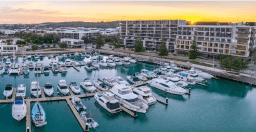The evolution of Noosa
From the pioneering days of T.M Burke in 1924, through to the expansive reach of Hooker Corporation and on to the evolution of Australand into the business we know as Frasers Property Australia today, ours is a centenary-long history rich with stories of the development of Australia. As we approach our 100 years celebration in 2024, we’re looking back at some of those stories and places that have gone on to shape who we are and the way we live today.
There are few places in Australia as beloved in the minds of holidaymakers as the Sunshine Coast. With its pristine beaches, verdant hinterland, and perennial air of summer, this strip of Queensland coastal paradise is the second most visited location in the state behind Brisbane; a fact that comes as no surprise to anyone that’s ventured along David Low Way during the school holidays.
A lesser-known fact is that a large slice of the atmosphere and accessibility of the region is thanks to the development savvy of one Thomas Michael Burke and his son, Marcus Burke.
In 1927, the elder Burke visited the Tewantin / Noosa area and saw its potential. Acquiring land just south of the existing Noosa township, he launched Noosa Beach Estate, where securing your own slice of paradise could be facilitated with a £10 deposit (about $900 in today’s money) and £1 a month over 7 years.
Spectacular location aside, the advent of the Great Depression and the Second World War, slowed development of the estate to a virtual stop. After languishing for a quarter-century, renewal came in the form of a deal with the just-elected National Party state government in the mid-1950s.
With ambitious plans to build a new coastal highway between Bribie Island and Noosa Heads, premier Frank Nicklin cut a deal with T.M Burke. In exchange for building the David Low Way, Burke’s company – —now under the stewardship of his son, Marcus – —would develop three townships along the route: the revitalised Noose Beach Estate (now renamed the Sunshine Beach Estate), Marcus Beach, and Peregian Beach.
Development continued right through the ‘70s and ‘80s, with the region blossoming thanks to the infrastructure built by T.M Burke and the undeniable attraction of the climate and lifestyle. Today, the Sunshine Coast is one of the most iconic and alluring destinations in the country.


